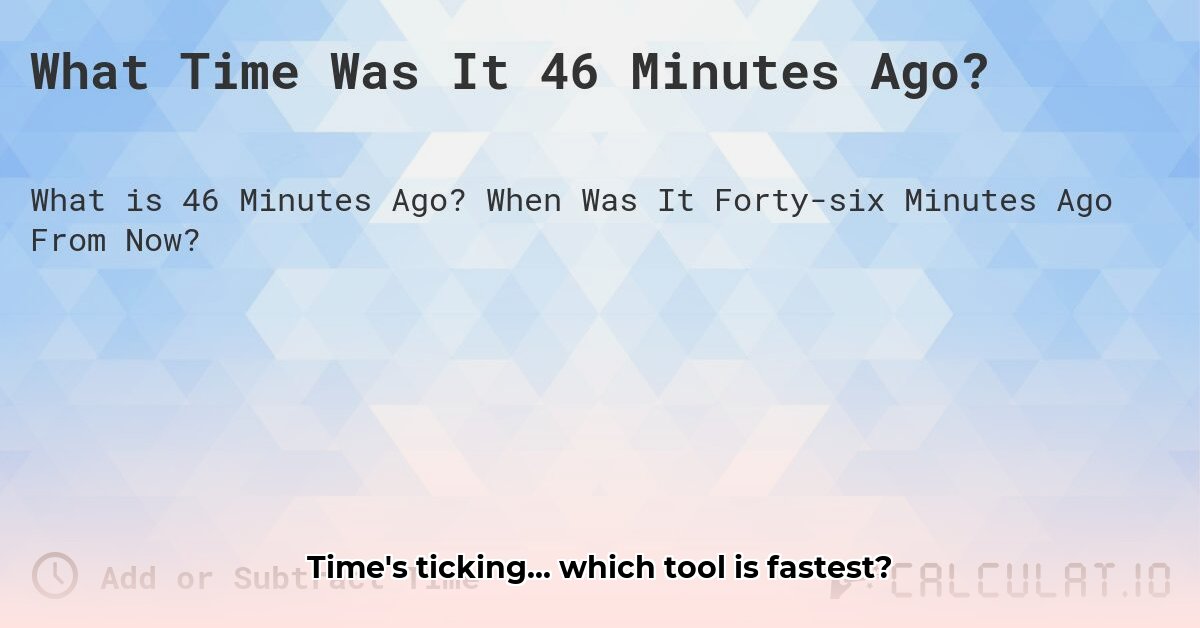
Ever needed to quickly determine the time 46 minutes ago, or perhaps calculate a precise time difference for a project? Selecting the right online tool can significantly improve efficiency. This review compares two popular options: datetimego.com and datetimecalculator.net, highlighting their strengths and weaknesses to help you choose the best fit.
datetimego.com: Speed and Simplicity
datetimego.com excels in its simplicity and speed. Ideal for quick, straightforward time calculations (e.g., determining the time 46 minutes prior), its interface is remarkably user-friendly. Inputting the number of minutes yields an immediate result. Its lightweight design ensures fast loading and minimal resource consumption.
Pros:
- Exceptional Speed: Near-instantaneous results are perfect for quick time estimations.
- Ease of Use: The intuitive interface requires minimal learning curve.
- Lightweight: Minimal resource usage ensures a smooth user experience.
Cons:
- Limited Functionality: Calculations are restricted to minutes only; hours, seconds, or dates are not supported.
- Basic Output: Only the calculated time is displayed; no date information is included.
- Not Suitable for Complex Calculations: Lacks the features for more sophisticated time-related tasks.
datetimecalculator.net: Precision and Detail
datetimecalculator.net offers a more comprehensive approach to time calculations. This tool handles hours, minutes, and seconds, providing highly precise results. It's suitable for scenarios requiring detailed date and time information. While slightly more complex than datetimego.com, its added capabilities justify the extra effort for specific use cases.
Pros:
- High Accuracy: Handles hours, minutes, and seconds for granular calculations.
- Detailed Output: Provides both the date and time, providing a complete timestamp.
- Versatile: Suitable for a wide range of tasks, from scheduling to project duration tracking.
Cons:
- Steeper Learning Curve: The more extensive feature set results in a slightly less intuitive interface than
datetimego.com. - Overkill for Simple Tasks: Its precision may be unnecessary for basic time checks.
- Higher Resource Consumption: Loading and processing times might be slightly longer compared to the simpler alternative.
Feature Comparison: A Head-to-Head Analysis
The following table summarizes the key differences between the two tools:
| Feature | datetimego.com | datetimecalculator.net |
|---|---|---|
| Input Units | Minutes only | Hours, Minutes, Seconds |
| Output Detail | Time only | Date and Time |
| Ease of Use | Extremely Easy | Moderately Easy |
| Best Use Case | Quick, simple time estimations | Precise, detailed time calculations |
| Speed | Very Fast | Relatively Fast |
Choosing the Right Tool: Prioritize Your Needs
The optimal choice depends entirely on your specific requirements. For quick, simple time estimations, datetimego.com's speed and simplicity are unmatched. However, when precision and detailed date/time information are paramount, datetimecalculator.net provides the necessary accuracy and functionality. Consider whether rapid results or granular detail are more crucial in your workflow.
Pivotal Points:
- Speed versus precision: Prioritize speed for quick estimates, precision for critical calculations.
- Simplicity versus functionality: Choose the tool that best matches the complexity of your task.
- User experience: Consider the ease of use and interface familiarity when selecting your preferred tool.
This comparative review provides the necessary information to make an informed decision based on individual needs. The right tool can significantly enhance accuracy and efficiency in handling time-related tasks.